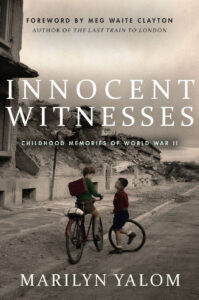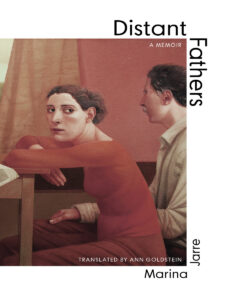

Displaced, lost childhoods and influences in adulthood (Europe and US; 1925 – 1960): Today’s post is on January 27th because it’s International Holocaust Remembrance Day. Established by the UN in 2005, their 2022 global theme is “Memory, Dignity and Justice”. Memory is a running theme throughout both of these stellar books:
Innocent Witnesses shines a piercing lens on six European Jewish childhoods lived through the Holocaust and on the author’s, who grew up in Washington, DC, lost Polish family in the Holocaust, and was deeply affected by the suffering until the end of her life. Marilyn Yalom wrote this book while battling cancer.
In A Matter of Death and Life, you’ll be moved by how profoundly loved, loving, and life-affirming Yalom’s life was (she died in 2019). She had an extensive network of “colleagues and friends” – six whose mini-memoirs make up the heart of the book. Two she translated from the French as she was a French professor at Stanford University for thirty years. During her junior year in college, she spent time in France witnessing the Nazi’s destruction. (Yalom was also a pioneering feminist and nonfiction author of landmark books.)
In her personal introduction, Meg Waite Clayton, bestselling author of several novels set during WWII, says Marilyn Yalom was a “bringer-together-of-people.” That’s what she’s done in Innocent Witnesses. It’s the commonalities of their memories – unrelenting hunger, “brutal winters,” air raids, “carpets of bombs” – as they paid witness to the tremendous risks, sacrifices, and bravery of their mothers to protect them that stand out.
These memories and commentaries (Yalom offers hers in “A Sheltered Vision and the French Connection,” the Epilogue, and “When Memory Speaks”) inform our reading of Distant Fathers, especially from an intense psychological perspective.
Time and place now vary. Two places, Latvia and Italy. Time is structured in three parts – childhood, adolescence, and adulthood – yet they don’t necessarily come to us chronologically. They float, dream-like, “stream-of-consciousness.” That’s intentional so we sense Marina Jarre’s “disorientation and displacement – the feeling of not belonging,” explains Ann Goldstein in her insightful Translator’s Note. (Best known for translating Elena Ferrante’s four Neapolitan Novels; also The Complete Works of Primo Levi, who survived the Auschwitz Nazi concentration camp). Jarre, she also says, is an “unreliable narrator,” certainly compared to the innocent witnesses whose memories feel fixed in their souls.
Reliable or not, we’re drawn to both books.
The six children lived during the atrocious time of Hitler’s war in different places: France, Germany, Finland, Sweden, Czechoslovakia, England, and Hungary. We may not know their names – Alain Briottet, Philippe Martial, Winfried Weiss, Stina Katchadourian, Susan Groag Bell, and Robert “Bob” Berger – but we learn that what they remembered endured influencing who they became.
Given the resiliency of their suffering under the most extreme physical conditions and emotional duress, the innocent witnesses inspire us. Jarre’s prose affects us differently. Exquisitely sad. Intellectually powerful, yet she’s a jumble of emotions and contradictions. Her prose is clear and lyrical when she writes about the natural world, but when she writes about herself and her relationships with important people in her life – her mother, father, maternal grandmother, and husband – she’s painfully distant so we keep trying to figure her out. Because she was still searching. (She died in 2016.)
We want to understand one of the undiscovered “great Italian writers of the second half of the twentieth century,” says Italian writer Marta Barone in her aptly titled introduction, “A Stubborn Distance.” Translating this book is the first in a larger effort to give Jarre “a rightful place in Italian literature.”
Barone confirms Jarre was “a great and lingering mystery.” For instance: Was she haunted by the death of her Russian Jewish father killed by the Nazis in her homeland in Riga, Latvia? She hardly knows him, regrets her “silence” with him, but she doesn’t even mention the “extermination of the Jews of Riga” (25,000), It’s Goldstein who does.

St. Peter’s Church Tower, Riga, Latvia
By Diliff [CC BY-SA 3.0] via
Wikimedia Commons
Jarre lived in Riga for the first ten years of her life. She didn’t learn of her father’s death until after her mother left him, when she was living in her maternal grandmother’s house in the village of Torre Pellice in the Waldensian valleys of the Piedmont region of Italy near Turin for the next ten. Instead of the massacre of Jews, this French-speaking region is steeped in ancient Protestant “persecutions and battles of distant fathers,” Barone explains. The most famous the 1655 Piedmont Easter Massacre.
No one can really know why the innocent witnesses were resilient and Jarre’s distance kept her from thriving – the psychological question that fascinated me. I think Ben Yalom’s (one of the author’s sons) assessment in the Afterword that “love and empathy are deeply entwined” in all the stories provides the answer. Jarre’s life was also uprooted during wartime but there’s very little, if any, love and empathy.
What’s clear is she liked almost no one. Jealous of her younger sister Sisi who gets whatever “praise” is doled out by her mother, yet recognizes Sisi was the only one loyal to her. Her mother was constantly away working, so in the identity-searching years of adolescence she seems to have been raised by a governess, sometimes two, not her grandmother, but doesn’t even mention their names. Mother and grandmother severely lack the “warmth and love” Ben eloquently writes about. Her emotional detachment is glaring.
Jarre had the physical trappings the innocent witnesses were deprived of, but lacked love. Her mother didn’t go to extraordinary lengths to protect her like the others did. Jarre is so torn up, an innocent victim who turned inward and blamed herself for her fears, contradictions, insecurities. At times, she’s acutely self-aware; at other times she gravitates between feeling inferior and superior. She’s out of sync with how we read her, notably when she says she’s “serenely solitary.” Except for the natural world, she never comes across as serene. Solitary, indeed, in whatever space she’s in.
Religion occupies many of Jarre’s thoughts – her connection to G-d. There’s no legacy of her father’s Jewish roots. Raised Lutheran, her grandmother devoutly so. Since the outside world is so confusing and disturbing to her, it makes sense she’s drawn to religious rituals. Order to brace the dislocation. Language a piece of that as she spoke German in Latvia not Latvian, had to learn Italian, and picked up French spoken in her grandmother’s house. She speaks of a “repugnance” towards Hitler, perhaps because of her father, but this doesn’t surface until much later, in 1943 when Hitler occupied Italy and Fascism fell. Her mother once an early fascist. Since she’s so wrapped up in seeking – but never getting – her mother’s love, it’s hard to tell which oppressive ideology is more repugnant. At this life stage, “rage” tragically defines her. “When had I ever been happy?” We wonder too.
Distant Fathers is described as a “singular autobiography” (on the back cover) and a memoir (on the front cover). Both are right. As an autobiography, it encompasses the arc of her life; a memoir doesn’t. An autobiography should be fact-based, but her memories are muddled. It’s her elusive, discordant emotions that make Marina Jarre a singular and mysterious character whose prose captivates.
Both books show that what’s remembered, observed, sensed, reflected on, and dreamed of illuminate how trauma influences lives. For good and bad.
Lorraine